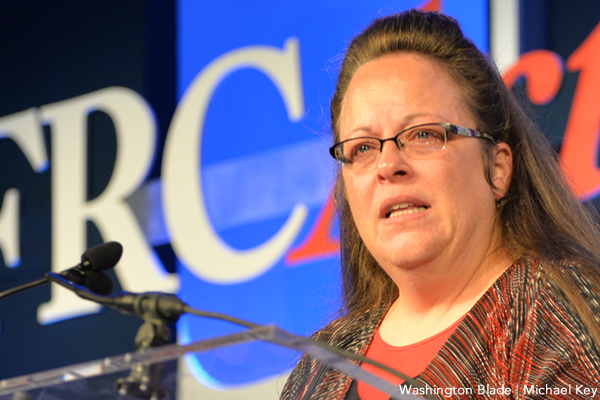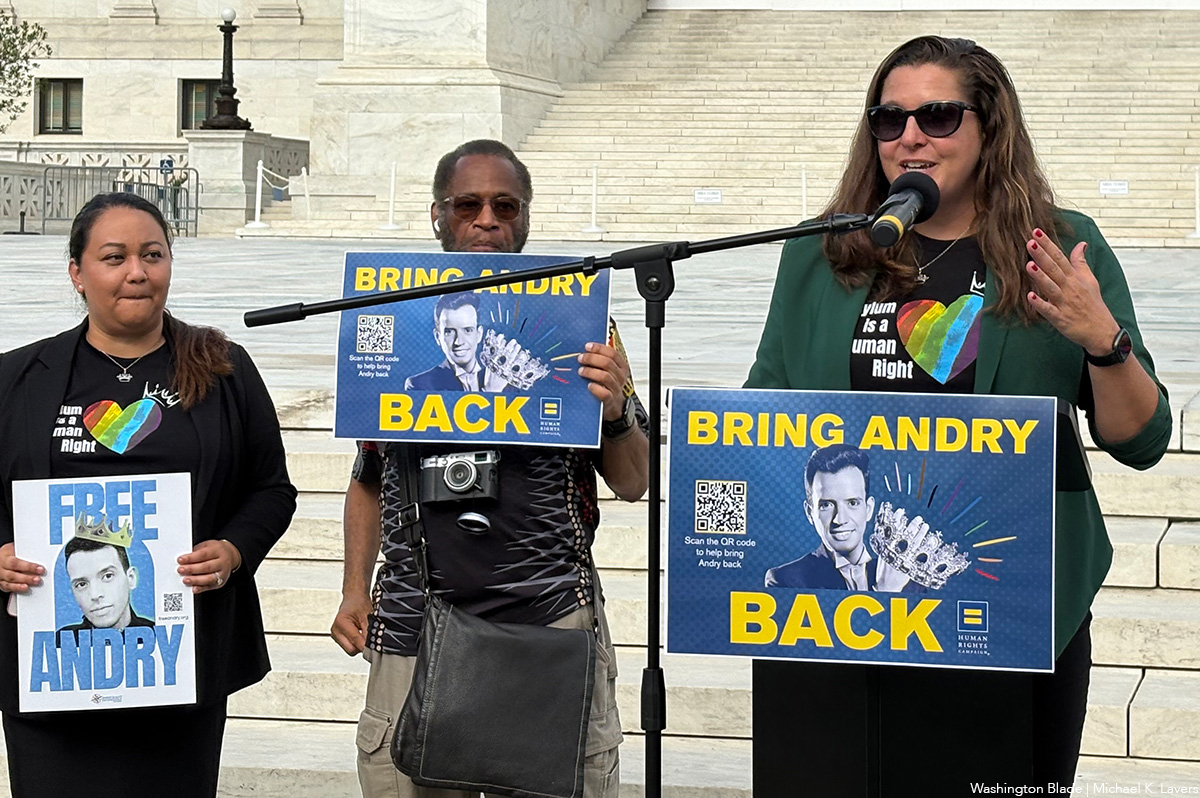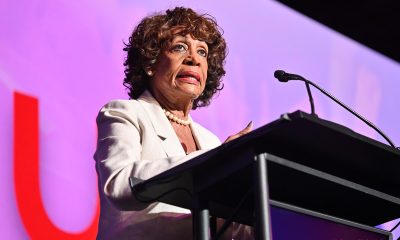U.S. Supreme Court
Trans rights supporters, opponents rally outside Supreme Court as justices consider Tenn. law
Oral arguments in U.S. v. Skrmetti case took place Wednesday

At least 1,000 people rallied outside the U.S. Supreme Court on Wednesday as the justices considered whether a Tennessee law banning gender-affirming medical care for transgender youth is unconstitutional.
Dueling rallies began early in the morning, with protesters supporting trans rights and protesters supporting Tennessee’s ban on gender-affirming care each stationed with podiums on opposite sides.
Trans rights protesters, who significantly outnumbered the other group, held signs reading “Keep hate out of healthcare,” and “Respect family medical decisions.” On the other side, protesters carried signs with messages like “Sex change is fantasy,” and “Stop transing gay kids.”
Ari, a trans person who grew up in Nashville and now lives in D.C., spoke to the Washington Blade about the negative effects of the Tennessee law on the well-being of trans youth.
“I grew up with kids who died because of a lack of trans healthcare, and I am scared of that getting worse,” they said. “All that this bill brings is more dead kids.”
The Tennessee law that is being challenged in U.S. v Skrmetti took effect in 2023 and bans medical providers from prescribing medical treatments such as puberty blockers and hormone therapies to trans youth.
A number of Democratic lawmakers, including U.S. Rep. Mark Takano (D-Calif.), co-chair of the Congressional Equality Caucus, and U.S. Sens. Ed Markey (D-Mass.) and Jeff Merkley (D-Ore.) addressed the crowd in support of trans rights.
In his speech, Merkley said Americans deserved freedom in accessing gender affirming care and criticized the law as political intervention in private medical decisions.
“Americans should have the freedom to make medical decisions in the privacy of their doctor’s office without politicians trying to dictate to them,” he said.
Robert Garofalo, a chief doctor in the division of Adolescent and Young Adult Medicine at a Chicago children’s hospital, emphasized the importance of trans youth having access to gender affirming care.
“We [providers] are seeing patients and families every day, present with crippling fears, added stress and anxiety as they desperately try to locate care where it remains legal to do so,” Garofalo, who is also a professor of pediatrics at Northwestern University, told the crowd. “Transgender children and adolescents deserve health care that is grounded in compassion, science and principles of public health and human rights. They must not be denied life saving medical care — their lives depend on it.”
Major U.S. medical associations, including the American Medical Association and the American Academy of Pediatrics, support gender affirming care.
Research has found gender affirming care improves the mental health and overall well-being of gender diverse children and adolescents. Those who are denied access to gender affirming care are at increased risk for significant mental health challenges.
An unlikely coalition came out to support Tennessee’s ban on gender affirming care. Far-right figures, such as U.S. Rep. Marjorie Taylor Greene (R-Ga.) and Matt Walsh — both of whom have a history of making homophobic statements — were joined by groups such as the LGBT Courage Coalition and Gays Against Groomers.
The groups questioned the quality of the research finding gender-affirming care to have a positive effect on the well-being of trans and gender nonconforming youth and argued that minors cannot consent to medical treatment. Ben Appel, a co-founder of the LGBT Courage Coalition, which he notes was “co-founded by gay, lesbian, bisexual, and trans adults who oppose pediatric gender medicine, which we know to be non-evidence-based and harmful to young gay people,” said gender nonconformity is often part of the lesbian, gay, and bisexual experience and should not be “medicalized.”
“I care about the adult gay detransitioners who have been harmed … by these homophobic practice,” he said “They should have just been told they’re gay.”
Claire, a Maryland resident who attended the rally in favor of the Tennessee law and claims to have detransitioned, described being prescribed testosterone and having a mastectomy at 14, medical treatments she says she was unable to consent to at that age. She doesn’t oppose gender affirming care for adults but is opposed to “medical experimentation on children.”
“I think that adults should be allowed to do whatever they want with their bodies. I think that it is if someone is happy with the decision that they made that’s great,” she said. “I was not able to make that decision. I was a child.”

But trans activists fear that a ruling in favor of Tennessee could pave the way for states to restrict access to gender-affirming care for adults.
“There’s also broader implications for civil rights and trans rights, more broadly, for adults in the future. There are some states that have tried to ban some healthcare for adults — they haven’t yet — but I think that’s something we might also see if the Supreme Court rules that way,” Ethan Rice, a senior attorney at Lambda Legal, one of the legal organizations representing the plaintiffs in U.S. v Skrmetti, said.
In the case, three Tennessee families and a physician are challenging the Tennessee law on the grounds that it violates the Equal Protection Clause in the 14th Amendment by drawing lines based on sex and discriminating against trans people. The statute bans medications for trans children while allowing the same medications to be used when treating minors suffering from other conditions, such as early-onset puberty.
A 2020 Supreme Court decision determined sex-based discrimination includes discrimination based on gender identity or sexual orientation. The key question in U.S. v. Skrmetti is whether this interpretation applies under the Equal Protection Clause.
“We really hope that the Supreme Court recognizes their own precedent on sex discrimination cases and comes out the right way, saying this is sex discrimination by the state of Tennessee and thus is unconstitutional,” Rice said.
Twenty-six states currently have laws or policies restricting minors’ access to gender-affirming care. If the court rules against Tennessee, similar bans in other states would also be unconstitutional, granting trans youth greater access to gender affirming care nationwide.
Edith Guffey, the board chair at PFLAG, expressed doubt the court will strike down the law, citing its sharp ideological turn to the right in recent years. But she said she remains hopeful.
“I hope that the court will … step outside agendas and look at the needs of people and who has the right to say what’s good for their children,” she said.
Chase Strangio, an ACLU attorney representing the families, on Wednesday became the first openly trans lawyer to argue before the Supreme Court. He addressed the trans rights protesters after the hearing.
“Whatever happens, we are the defiance,” Strangio said. “We are collectively a refutation of everything they say about us. And our fight for justice did not begin today, it will not end in June — whatever the court decides.”

U.S. Supreme Court
Competing rallies draw hundreds to Supreme Court
Activists, politicians gather during oral arguments over trans youth participation in sports

Hundreds of supporters and opponents of trans rights gathered outside of the United States Supreme Court during oral arguments for Little v. Hecox and West Virginia v. B.P.J. on Tuesday. Two competing rallies were held next to each other, with politicians and opposing movement leaders at each.
“Trans rights are human rights!” proclaimed U.S. Sen. Ed Markey (D-Mass.) to the crowd of LGBTQ rights supporters. “I am here today because trans kids deserve more than to be debated on cable news. They deserve joy. They deserve support. They deserve to grow up knowing that their country has their back.”

“And I am here today because we have been down this hateful road before,” Markey continued. “We have seen time and time again what happens when the courts are asked to uphold discrimination. History eventually corrects those mistakes, but only after the real harm is done to human beings.”
View on Threads
U.S. Education Secretary Linda McMahon spoke at the other podium set up a few feet away surrounded by signs, “Two Sexes. One Truth.” and “Reality Matters. Biology Matters.”
“In just four years, the Biden administration reversed decades of progress,” said McMahon. “twisting the law to urge that sex is not defined by objective biological reality, but by subjective notion of gender identity. We’ve seen the consequences of the Biden administration’s advocacy of transgender agendas.”

U.S. Rep. Mark Takano (D-Calif.), chair of the Congressional Equality Caucus, was introduced on the opposing podium during McMahon’s remarks.
“This court, whose building that we stand before this morning, did something quite remarkable 6 years ago.” Takano said. “It did the humanely decent thing, and legally correct thing. In the Bostock decision, the Supreme Court said that trans employees exist. It said that trans employees matter. It said that Title VII of the Civil Rights Act protects employees from discrimination based on sex, and that discrimination based on sex includes discrimination based on gender identity and sexual orientation. It recognizes that trans people have workplace rights and that their livelihoods cannot be denied to them, because of who they are as trans people.”
“Today, we ask this court to be consistent,” Takano continued. “If trans employees exist, surely trans teenagers exist. If trans teenagers exist, surely trans children exist. If trans employees have a right not to be discriminated against in the workplace, trans kids have a right to a free and equal education in school.”
Takano then turned and pointed his finger toward McMahon.
“Did you hear that, Secretary McMahon?” Takano addressed McMahon. “Trans kids have a right to a free and equal education! Restore the Office of Civil Rights! Did you hear me Secretary McMahon? You will not speak louder or speak over me or over these people.”
Both politicians continued their remarks from opposing podiums.
“I end with a message to trans youth who need to know that there are adults who reject the political weaponization of hate and bigotry,” Takano said. “To you, I say: you matter. You are not alone. Discrimination has no place in our schools. It has no place in our laws, and it has no place in America.”
U.S. Supreme Court
Supreme Court hears arguments in two critical cases on trans sports bans
Justices considered whether laws unconstitutional under Title IX

The Supreme Court heard two cases today that could change how the Equal Protection Clause and Title IX are enforced.
The cases, Little v. Hecox and West Virginia v. B.P.J., ask the court to determine whether state laws blocking transgender girls from participating on girls’ teams at publicly funded schools violates the 14th Amendment’s Equal Protection Clause and Title IX. Once decided, the rulings could reshape how laws addressing sex discrimination are interpreted nationwide.
Chief Justice John Roberts raised questions about whether Bostock v. Clayton County — the landmark case holding that Title VII of the Civil Rights Act of 1964 protects employees from discrimination based on sexual orientation or gender identity — applies in the context of athletics. He questioned whether transgender girls should be considered girls under the law, noting that they were assigned male at birth.
“I think the basic focus of the discussion up until now, which is, as I see it anyway, whether or not we should view your position as a challenge to the distinction between boys and girls on the basis of sex or whether or not you are perfectly comfortable with the distinction between boys and girls, you just want an exception to the biological definition of girls.”
“How we approach the situation of looking at it not as boys versus girls but whether or not there should be an exception with respect to the definition of girls,” Roberts added, suggesting the implications could extend beyond athletics. “That would — if we adopted that, that would have to apply across the board and not simply to the area of athletics.”
Justice Clarence Thomas echoed Roberts’ concerns, questioning how sex-based classifications function under Title IX and what would happen if Idaho’s ban were struck down.
“Does a — the justification for a classification as you have in Title IX, male/female sports, let’s take, for example, an individual male who is not a good athlete, say, a lousy tennis player, and does not make the women’s — and wants to try out for the women’s tennis team, and he said there is no way I’m better than the women’s tennis players. How is that different from what you’re being required to do here?”
Justice Samuel Alito addressed what many in the courtroom seemed reluctant to state directly: the legal definition of sex.
“Under Title IX, what does the term ‘sex’ mean?” Alito asked Principal Deputy Solicitor General Hashim Mooppan, who was arguing in support of Idaho’s law. Mooppan maintained that sex should be defined at birth.
“We think it’s properly interpreted pursuant to its ordinary traditional definition of biological sex and think probably given the time it was enacted, reproductive biology is probably the best way of understanding that,” Mooppan said.
Justice Sonia Sotomayor pushed back, questioning how that definition did not amount to sex discrimination against Lindsay Hecox under Idaho law. If Hecox’s sex is legally defined as male, Sotomayor argued, the exclusion still creates discrimination.
“It’s still an exception,” Sotomayor said. “It’s a subclass of people who are covered by the law and others are not.”
Justice Elena Kagan highlighted the broader implications of the cases, asking whether a ruling for the states would impose a single definition of sex on the 23 states that currently have different laws and standards. The parties acknowledged that scientific research does not yet offer a clear consensus on sex.
“I think the one thing we definitely want to have is complete findings. So that’s why we really were urging to have a full record developed before there were a final judgment of scientific uncertainty,” said Kathleen Harnett, Hecox’s legal representative. “Maybe on a later record, that would come out differently — but I don’t think that — ”

“Just play it out a little bit, if there were scientific uncertainty,” Kagan responded.
Justice Brett Kavanaugh focused on the impact such policies could have on cisgender girls, arguing that allowing transgender girls to compete could undermine Title IX’s original purpose.
“For the individual girl who does not make the team or doesn’t get on the stand for the medal or doesn’t make all league, there’s a — there’s a harm there,” Kavanaugh said. “I think we can’t sweep that aside.”
Justice Amy Coney Barrett questioned whether Idaho’s law discriminated based on transgender status or sex.
“Since trans boys can play on boys’ teams, how would we say this discriminates on the basis of transgender status when its effect really only runs towards trans girls and not trans boys?”
Harnett responded, “I think that might be relevant to a, for example, animus point, right, that we’re not a complete exclusion of transgender people. There was an exclusion of transgender women.”
Justice Ketanji Brown Jackson challenged the notion that explicitly excluding transgender people was not discrimination.
“I guess I’m struggling to understand how you can say that this law doesn’t discriminate on the basis of transgender status. The law expressly aims to ensure that transgender women can’t play on women’s sports teams… it treats transgender women different than — than cis-women, doesn’t it?”
Idaho Solicitor General Alan Hurst urged the court to uphold his state’s ban, arguing that allowing participation based on gender identity — regardless of medical intervention — would deny opportunities to girls protected under federal law.
Hurst emphasized that biological “sex is what matters in sports,” not gender identity, citing scientific evidence that people assigned male at birth are predisposed to athletic advantages.
Joshua Block, representing B.P.J., was asked whether a ruling in their favor would redefine sex under federal law.
“I don’t think the purpose of Title IX is to have an accurate definition of sex,” Block said. “I think the purpose is to make sure sex isn’t being used to deny opportunities.”
Becky Pepper-Jackson, identified as plaintiff B.P.J., the 15-year-old also spoke out.
“I play for my school for the same reason other kids on my track team do — to make friends, have fun, and challenge myself through practice and teamwork,” said Pepper-Jackson. “And all I’ve ever wanted was the same opportunities as my peers. But in 2021, politicians in my state passed a law banning me — the only transgender student athlete in the entire state — from playing as who I really am. This is unfair to me and every transgender kid who just wants the freedom to be themselves.”

Outside the court, advocates echoed those concerns as the justices deliberated.
“Becky simply wants to be with her teammates on the track and field team, to experience the camaraderie and many documented benefits of participating in team sports,” said Sasha Buchert, counsel and Nonbinary & Transgender Rights Project director at Lambda Legal. “It has been amply proven that participating in team sports equips youth with a myriad of skills — in leadership, teamwork, confidence, and health. On the other hand, denying a student the ability to participate is not only discriminatory but harmful to a student’s self-esteem, sending a message that they are not good enough and deserve to be excluded. That is the argument we made today and that we hope resonated with the justices of the Supreme Court.”
“This case is about the ability of transgender youth like Becky to participate in our schools and communities,” said Joshua Block, senior counsel for the ACLU’s LGBTQ & HIV Project. “School athletics are fundamentally educational programs, but West Virginia’s law completely excluded Becky from her school’s entire athletic program even when there is no connection to alleged concerns about fairness or safety. As the lower court recognized, forcing Becky to either give up sports or play on the boys’ team — in contradiction of who she is at school, at home, and across her life — is really no choice at all. We are glad to stand with her and her family to defend her rights, and the rights of every young person, to be included as a member of their school community, at the Supreme Court.”
The Supreme Court is expected to issue rulings in both cases by the end of June.
U.S. Supreme Court
Supreme Court rejects Kim Davis’s effort to overturn landmark marriage ruling
Justices declined to revisit the Obergefell decision

The U.S. Supreme Court has declined to hear an appeal from Kim Davis, the former Rowan County, Ky., clerk best known for refusing to issue marriage licenses to same-sex couples after the landmark 2015 Obergefell v. Hodges decision legalized same-sex marriage nationwide.
Following the Obergefell ruling, Davis stopped issuing marriage licenses altogether and has since filed multiple appeals seeking to challenge same-sex marriage protections. The court once again rejected her efforts on Monday.
In this latest appeal, Davis sought to overturn a $100,000 monetary award she was ordered to pay to David Moore and David Ermold, a same-sex couple to whom she denied a marriage license. Her petition also urged the court to use the case as a vehicle to revisit the constitutional right to same-sex marriage.
The petition, along with the couple’s brief in opposition, was submitted to the Supreme Court on Oct. 22 and considered during the justices’ private conference on Nov. 7. Davis needed at least four votes for the court to take up her case, but Monday’s order shows she fell short.
Cathy Renna, the director of communications for the National LGBTQ Task Force, a non-profit organization that works towards supporting the LGBQ community through grassroots organizing told the Los Angeles Blade:
“Today’s decision is not surprising given the longshot status of Davis’s claim, but it’s a relief that the Supreme Court will not hear it, given the current make up of the court itself. We hope that this settles the matter and marriage equality remains the law of the land for same-sex couples.”
Human Rights Campaign President Kelley Robinson released the following statement:
“Today, love won again. When public officials take an oath to serve their communities, that promise extends to everyone — including LGBTQ+ people. The Supreme Court made clear today that refusing to respect the constitutional rights of others does not come without consequences.
Thanks to the hard work of HRC and so many, marriage equality remains the law of the land through Obergefell v. Hodges and the Respect for Marriage Act. Even so, we must remain vigilant.
It’s no secret that there are many in power right now working to undermine our freedoms — including marriage equality — and attack the dignity of our community any chance they get. Last week, voters rejected the politics of fear, division, and hate, and chose leaders who believe in fairness, freedom, and the future. In race after race, the American people rejected anti-transgender attacks and made history electing pro-equality candidates up and down the ballot.
And from California to Virginia to New Jersey to New York City, LGBTQ+ voters and Equality Voters made the winning difference. We will never relent and will not stop fighting until all of us are free.”
This story is developing and will be updated as more information becomes available.
U.S. Supreme Court
Federal judge strikes down Biden rule protecting transgender health care rights
Republican-led states sued over the 2024 regulations

A federal judge has ruled that federal anti-discrimination protections for transgender people in health care are unconstitutional, allowing legal discrimination in health care against trans individuals in the U.S.
Judge Louis Guirola, Jr., of the U.S. District Court for the Southern District of Mississippi sided with a coalition of 15 GOP-led states that sued over the rule, which broadened sex discrimination to include sexual orientation and gender identity in health care, the Hill reported.
The U.S. Department of Health and Human Services “exceeded its authority by implementing regulations redefining sex discrimination and prohibiting gender identity discrimination,” Guirola wrote.
The expanded definition of sex discrimination to include sexual orientation and gender identity was part of Section 1557 of the Affordable Care Act. The Biden-Harris administration implemented it to strengthen protections against health care discrimination for LGBTQ people. It previously prevented discrimination in health care services, insurance coverage, and program participation.
This is not the first time such protections have faced legal challenges. In 2016, the Obama-Biden administration advanced similar rules to prevent health care providers from denying services — particularly gender-affirming care — that they would otherwise offer to other patients.
During President Donald Trump’s first term, those protections were reversed when his administration redefined Title IX protections to apply only to race, color, national origin, “biological sex,” age, or disability — explicitly excluding trans people.
In 2024, the Biden-Harris administration reinstated these protections, only for them to be struck down by Republican-appointed Guirola.
Tennessee Attorney General Jonathan Skrmetti celebrated the ruling, saying in a statement, “This decision restores not just common sense but also constitutional limits on federal overreach, and I am proud of the team of excellent attorneys who fought this through to the finish.”
The decision comes as the U.S. Supreme Court recently heard arguments on banning so-called conversion therapy, and may soon take up a case involving the right to same-sex marriage.
National
LGBTQ rights on the line: What to watch as Supreme Court’s new term begins
The Supreme Court will hear cases shaping transgender sports participation and conversion therapy, with major LGBTQ rights implications.

The Supreme Court’s new term begins this week, with multiple cases on the docket that could have serious consequences for the civil rights of the LGBTQ community.
Many issues are being debated this term, including the scope of civil rights protections under the Equal Protection Clause, Title IX, and the Voting Rights Act—all of which could leave LGBTQ Americans less protected.
This Supreme Court is different from years past. Its right-wing supermajority is utilizing a more activist approach to legal interpretation—siding more often with President Trump’s preferred interpretation of laws rather than a more constitutional evaluation. One Supreme Court Justice, Clarence Thomas, even went so far as to publicly state he has a problem with the way judges are restricted by past decisions, saying he is against the concept of stare decisis (or sticking to prior judges’ decisions) and that they are “not the gospel.”
There are three major cases that in some way impact—or have the possibility of impacting—the rights of LGBTQ Americans: West Virginia v. B.P.J., Little v. Hecox, and Chiles v. Salazar. The first two deal with the rights of transgender girls participating in sports. The last one, Chiles v. Salazar, centers around the legality of banning conversion therapy.
West Virginia v. B.P.J.
In West Virginia v. B.P.J., a transgender girl, known as B.P.J., takes gender-affirming medication and has since the onset of puberty. She wants to compete on her school’s cross-country and track teams. In 2021, West Virginia passed the “Save Women’s Sports Act,” which requires public school and collegiate sports teams to designate their players’ genders by “biological sex” rather than gender identity.
In this case, the Court will determine whether this act violates Title IX—a federal law prohibiting discrimination based on sex in education or any institution that receives federal funding—or the Equal Protection Clause, which prohibits unfair and unequal discrimination, by requiring B.P.J. to be on a team based on her biological sex.
As Joshua Block, senior counsel with the American Civil Liberties Union’s (ACLU) LGBT & HIV Project, explained, “In terms of the legal issues before the court, the West Virginia case presents both the Title IX issue and the equal protection issue.” He also highlighted the broader impact: “Some of the lower courts are actually holding their cases pending BPJ, the Seventh Circuit recently did that in one of their restroom cases.”
Little v. Hecox
In Little v. Hecox, the Court will similarly evaluate the legality of Idaho’s transgender sports law—the “Fairness in Women’s Sports Act,” which, since its passage in 2020, has barred any transgender girls from participating on public school-affiliated sports teams. There is specific wording in the law that says the hormones present in transgender women, regardless of their stage of transition, make them predisposed to winning and create an unfair playing field—even if transgender people take Gender-Affirming Hormone Therapy (GAHT).
Lindsay Hecox, a transgender woman and student at Boise State University, attempted to join the school’s cross-country team but was denied, with the school citing that her participation violates the law. Hecox, along with a cisgender high school athlete identified in court documents as Jane Doe, filed a suit arguing that the “Fairness in Women’s Sports Act” violated both of their constitutional rights under the Equal Protection Clause of the 14th Amendment.
Block noted during the briefing, “Lindsay, unlike BPJ, is a young woman in college, and she has not had blockers. She suppressed testosterone after puberty at the same time, as I mentioned, she was not, frankly, good enough to make the team, and has just been playing club sports.” Regarding procedural concerns, he added, “Unlike other cases where a party has sought to insulate a favorable judgment from review, we obviously think the decision below needs to be vacated because it’s moot.”
Block went on to spotlight that both West Virginia v. B.P.J. and Little v. Hecox are clearly supported by Title IX, using the Court’s decision in 2020 in Bostock v. Clayton County as the basis. In that case, the Court found that the Civil Rights Act of 1964 protects not only on the basis of sex and race, but also on sexual orientation and gender identity.
“There’s obviously an overlap on the question of whether, as a general matter, the Supreme Court’s reasoning in Bostock applies to Title IX,” Block said. “Bostock says you can’t fire someone for being transgender. I think it should go without saying that a school principal can’t expel someone for being transgender either. Despite that, the states are trying to argue that Bostock doesn’t apply to Title IX at all.”
Chiles v. Salazar
While West Virginia v. B.P.J. and Little v. Hecox examine Title IX and the Equal Protection Clause, Chiles v. Salazar evaluates the legality of a Colorado House Act banning conversion therapy under the Free Speech Clause of the First Amendment. The Free Speech Clause has five parts, but this case focuses on the right to practice the religion of one’s choosing and the provision that the state may not establish a religion. Conversion therapy is defined in this case as any practice that “changes behaviors or gender expressions or seeks to eliminate or reduce sexual or romantic attraction or feelings toward individuals of the same sex.”
In Chiles v. Salazar, Kaley Chiles, a licensed counselor who identifies as a Christian, has argued that HB19-1129, also known as the “Prohibit Conversion Therapy for a Minor Act,” violates her First Amendment rights. Chiles practices “faith-informed” counseling that seeks to “reduce or eliminate unwanted sexual attractions, change sexual behaviors, or grow in the experience of harmony with [their] physical body.” She brought forward a pre-enforcement lawsuit against the state, arguing that the law has made her refrain from discussing possible gender- and sexuality-related topics with her clients and has dampened her ability to provide counseling services in line with her and her clients’ religious preferences.
Josh Rovenger, the legal director at GLAD Law, an LGBTQ+ legal services and civil rights organization, explained what Chiles v. Salazar could mean for the future of LGBTQ rights in America.
“Fundamentally, what’s at stake… is whether a state like Colorado and the 23 other states, plus the District of Columbia that have similar laws have the ability to protect LGBTQ plus youth from disproven conversion therapy practices that cause lasting trauma to the individuals, their families, and entire communities.”
He went on, explaining that the scope of the law is so specific that the plaintiff’s concerns may not apply.
“The law here is really quite narrow, aimed at a very specific, specific prohibition, and a lot of the activities that the plaintiff says that she wants to engage in, as Colorado points out in its brief, just aren’t covered by the law,” Rovenger said. In addition, he added there are multiple states that have banned the practice of conversion therapy with little issue. “Multiple states which have bipartisan laws that were passed with widespread support, including support from religious communities, would potentially be invalidated as a result of that type of decision, and that would be overruling an overwhelming medical consensus about the evidence of conversion therapy practice harms.”
As GLAAD noted in a press release, “Every major medical and mental health association in the country condemns the practice and supports efforts to prevent practitioners from violating their oath to do no harm.”
The Bigger Picture
These cases, Rovenger explained, don’t collectively signal that the Supreme Court will side in one particular way, but rather that some of the justices are interested in the cases.
“The first is the fact that they took these cases only means that four justices were interested in hearing them,” Rovenger said. “It does not tell us anything about where they’re going to come out on the cases ultimately. And there was no reason for the court to take either of or any of these cases.”
Rovenger, who served as Associate Counsel to President Biden in the White House for Racial Justice & Equity, went on, emphasizing the importance of the broader political context in this legal targeting of trans kids.
“Before 2020, decisions about sports were being left to school districts and sports organizations, the people who know these issues best… And then in 2020 we saw trans issues more generally, but sports in particular, being used as a wedge issue and a weapon to further a political agenda,” he said. “Since the beginning of 2025 that has been on steroids from the federal administration, which has really targeted transgender individuals, generally, and transgender kids who just want the opportunity to play school sports for the same reason other kids do — to be part of a team where they feel like they belong.”
He continued, saying that these cases would mostly impact some of the most vulnerable LGBTQ population—LGBTQ youth.
“These cases are going to have significant implications for LGBTQ youth, for LGBTQ individuals more generally, for school environments, for the ability of states to protect LGBTQ youth from discredited medical practices. And so when we think about the day-to-day experience of LGBTQ folks in this country, particularly youth, these cases will have a direct impact on those lived experiences.”
A fourth case concerns marriage equality and a decade-old effort by former Kentucky county clerk Kim Davis to overturn the Obergefell ruling. Legal experts have called the effort a long shot. Justices will likely decide whether to hear the case later this fall.
U.S. Supreme Court
Activists rally for Andry Hernández Romero in front of Supreme Court
Gay asylum seeker ‘forcibly deported’ to El Salvador, described as political prisoner

More than 200 people gathered in front of the U.S. Supreme Court on Friday and demanded the Trump-Vance administration return to the U.S. a gay Venezuelan asylum seeker who it “forcibly disappeared” to El Salvador.
Lindsay Toczylowski, president of the Immigrant Defenders Law Center, a Los Angeles-based organization that represents Andry Hernández Romero, is among those who spoke alongside U.S. Rep. Mark Takano (D-Calif.) and Human Rights Campaign Campaigns and Communications Vice President Jonathan Lovitz. Sarah Longwell of the Bulwark, Pod Save America’s Jon Lovett, and Tim Miller are among those who also participated in the rally.
“Andry is a son, a brother. He’s an actor, a makeup artist,” said Toczylowski. “He is a gay man who fled Venezuela because it was not safe for him to live there as his authentic self.”
(Video by Michael K. Lavers)
The White House on Feb. 20 designated Tren de Aragua, a Venezuelan gang, as an “international terrorist organization.”
President Donald Trump on March 15 invoked the Alien Enemies Act of 1798, which the Associated Press notes allows the U.S. to deport “noncitizens without any legal recourse.” The Trump-Vance administration subsequently “forcibly removed” Hernández and hundreds of other Venezuelans to El Salvador.
Toczylowski said she believes Hernández remains at El Salvador’s Terrorism Confinement Center, a maximum-security prison known by the Spanish acronym CECOT. Toczylowski also disputed claims that Hernández is a Tren de Aragua member.
“Andry fled persecution in Venezuela and came to the U.S. to seek protection. He has no criminal history. He is not a member of the Tren de Aragua gang. Yet because of his crown tattoos, we believe at this moment that he sits in a torture prison, a gulag, in El Salvador,” said Toczylowski. “I say we believe because we have not had any proof of life for him since the day he was put on a U.S. government-funded plane and forcibly disappeared to El Salvador.”
“Andry is not alone,” she added.
Takano noted the federal government sent his parents, grandparents, and other Japanese Americans to internment camps during World War II under the Alien Enemies Act. The gay California Democrat also described Hernández as “a political prisoner, denied basic rights under a law that should have stayed in the past.”
“He is not a case number,” said Takano. “He is a person.”
Hernández had been pursuing his asylum case while at the Otay Mesa Detention Center in San Diego.
A hearing had been scheduled to take place on May 30, but an immigration judge the day before dismissed his case. Immigrant Defenders Law Center has said it will appeal the decision to the Board of Immigration Appeals, which the Justice Department oversees.
“We will not stop fighting for Andry, and I know neither will you,” said Toczylowski.
Friday’s rally took place hours after Attorney General Pam Bondi said Kilmar Abrego Garcia, a Maryland man who the Trump-Vance administration wrongfully deported to El Salvador, had returned to the U.S. Abrego will face federal human trafficking charges in Tennessee.
-

 Books4 days ago
Books4 days agoZoë Rose Bryant on her chart-topping debut novel ‘Good Friends’ and inspiring young trans people online
-

 Los Angeles4 days ago
Los Angeles4 days agoNikko LaMere’s photo exhibit “JOY!” documents the euphoria of Black queer nightlife
-

 Viewpoint4 days ago
Viewpoint4 days agoGay acceptance in US takes a dangerous reversal
-

 a&e features2 days ago
a&e features2 days agoTello Films: Celebrating 19 years of lesbian storytelling
-

 Commentary5 days ago
Commentary5 days agoValentine’s Day, Alone
-

 National4 days ago
National4 days agoLGBTQ+ activists mourn the Rev. Jesse Jackson
-

 Commentary4 days ago
Commentary4 days agoPost-Valentine’s Day: Are your standards protecting you — or keeping you single?
-

 Movies3 days ago
Movies3 days agoEva Victor winning best screenplay, Erin Doherty winning supporting actress, and more queer highlights of the 2026 Film Independent Spirit Awards
-

 Features18 hours ago
Features18 hours agoWhat’s next for “local hero” and longtime queer ally Genevieve Morrill
-

 a&e features20 hours ago
a&e features20 hours agoLiveplay series ‘Gladlands’ finds hope in the unlikeliest of places



